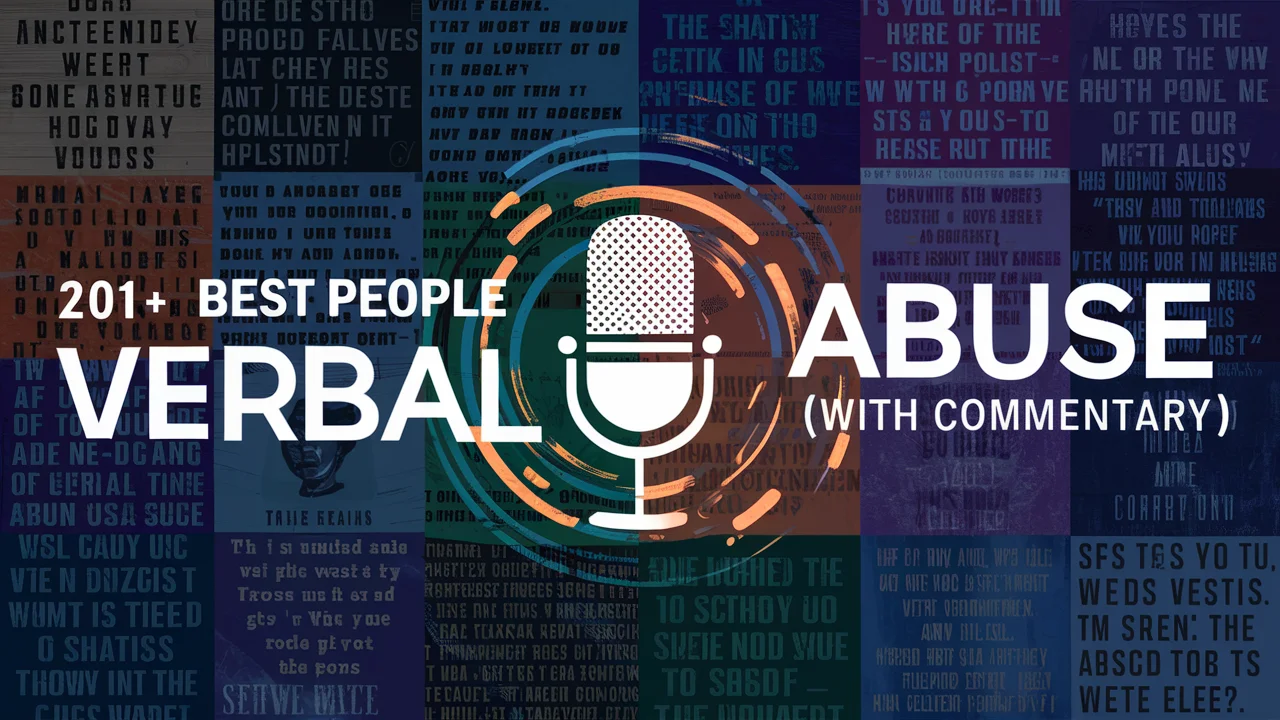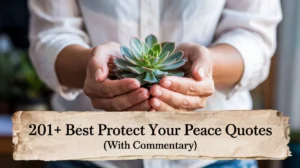Verbal abuse is an unfortunate reality that many people face, often in toxic relationships or environments. Words can be as damaging as physical actions, and the lasting effects of verbal abuse can haunt an individual for years.
This collection of over 201+ verbal abuse quotes explores the harshness, pain, and emotional toll of such experiences. Each quote is followed by commentary, providing insight into the mindset of both the abuser and the victim. These quotes are not only a reflection of people’s struggles but also an invitation to understand and break free from the cycle of abuse.
The Power of Words Understanding Verbal Abuse
- “Words can wound deeper than a blade.”
- “A cruel word spoken in anger can shatter a heart forever.”
- “The scars of verbal abuse are invisible but profound.”
- “Sometimes the silence that follows harsh words is louder than any shout.”
- “Verbal abuse doesn’t always come from strangers; sometimes it’s from those who should care the most.”
- “People often forget that words can stay with you long after the conversation is over.”
- “You can heal physically, but the scars from verbal abuse last a lifetime.”
- “Verbal abuse isn’t just about insults; it’s about controlling, diminishing, and belittling.”
- “The pain caused by words can linger long after the voice is gone.”
- “In a world full of harsh words, kindness should never be underestimated.”
- “Words are weapons in the hands of those who seek to control and manipulate.”
- “Verbal abuse is the art of tearing someone down with the very language they trust.”
- “An insult can feel like a weight that drags you down, even when it’s over.”
- “In abusive relationships, words become the chain that binds you.”
- “It’s easier to heal from a bruise than from a cutting remark.”
- “Harsh words are like smoke: they cloud your vision and burn your soul.”
- “When words lose their meaning, they become tools of destruction.”
- “The greatest damage of verbal abuse is not the words spoken, but the silence that follows.”
- “It’s not just the insults; it’s the way they make you doubt yourself.”
- “Verbal abuse is like a silent storm, it rages within you, unseen by others.”
Toxic Relationships and the Language of Abuse
- “In toxic relationships, love is often cloaked in verbal abuse.”
- “The words you hear in toxic relationships are the foundation of manipulation.”
- “Every insult in a toxic relationship is a seed of doubt planted in your mind.”
- “In the battle of words, the abuser seeks to weaken, not to heal.”
- “A toxic relationship isn’t just about the fights; it’s about the cruelty in the silence between them.”
- “In the world of verbal abuse, every word becomes a weapon, every silence a threat.”
- “Toxic people use words to strip away your sense of self-worth.”
- “The harshest criticism in a toxic relationship comes from the ones who say they love you.”
- “A relationship should uplift you, not break you down with every conversation.”
- “Words in toxic relationships are like chains; they keep you from moving forward.”
- “Abuse doesn’t have to be physical to be real. Words can cut just as deep.”
- “Toxic relationships breed verbal abuse, which slowly wears away your soul.”
- “Love should never come with an asterisk, nor should it come with verbal abuse.”
- “Every verbal attack in a toxic relationship erodes the foundation of trust.”
- “The worst part of verbal abuse is that it often comes from those closest to you.”
- “Toxic relationships thrive on belittling words and manipulative language.”
- “Words in toxic relationships are often used as tools of dominance.”
- “A toxic person makes you doubt your worth with every word they speak.”
- “In toxic relationships, love is often drowned out by harsh words and accusations.”
- “Every harsh word in a toxic relationship leaves an emotional bruise.”
The Emotional Toll of Verbal Abuse
- “Verbal abuse leaves emotional scars that are invisible to the world.”
- “You can’t always see the damage caused by words, but it can be just as painful as a punch.”
- “The emotional toll of verbal abuse is long-lasting and can change your perspective on love and trust.”
- “Emotional pain from verbal abuse lingers far longer than physical pain.”
- “The emotional scars of verbal abuse are often hidden, but they shape your entire identity.”
- “The damage of verbal abuse isn’t always immediate, but it’s profound.”
- “Verbal abuse doesn’t just break you down; it rewires the way you think about yourself.”
- “You can’t just ‘get over’ verbal abuse. It takes time, healing, and self-love.”
- “Words may fade, but the emotional aftermath of abuse remains in the heart.”
- “Emotional wounds from verbal abuse may heal, but they leave a lasting impression.”
- “It’s easy to dismiss emotional pain from verbal abuse, but it’s the hardest to heal.”
- “Verbal abuse chips away at your confidence until you no longer recognize yourself.”
- “The emotional toll of verbal abuse isn’t just the hurt; it’s the fear of it happening again.”
- “You don’t just heal from verbal abuse; you rebuild your sense of self-worth.”
- “The emotional damage from verbal abuse can make it hard to trust your feelings.”
- “Emotional healing from verbal abuse is slow, but it’s possible with time and support.”
- “The hardest part of verbal abuse is learning to trust yourself again.”
- “Verbal abuse doesn’t just hurt your feelings; it scars your emotional landscape.”
- “The emotional toll of verbal abuse isn’t just the immediate pain; it’s the long-term effects on your self-esteem.”
- “Words can destroy your confidence and leave you questioning everything you thought you knew.”
Overcoming the Lingering Effects of Verbal Abuse
- “Healing from verbal abuse requires not just time, but also the courage to confront the past.”
- “You can’t erase the past, but you can choose to rewrite your future.”
- “Overcoming verbal abuse means reclaiming your sense of self-worth, one day at a time.”
- “You can’t change what happened, but you can change how you let it affect you.”
- “Healing from verbal abuse isn’t about forgetting; it’s about learning to live beyond it.”
- “The hardest part of recovery is realizing that you deserve better than the words you were told.”
- “Overcoming verbal abuse means surrounding yourself with people who lift you.”
- “It takes strength to heal, but it takes wisdom to forgive yourself for letting it happen.”
- “The first step to healing is acknowledging the abuse, not brushing it under the rug.”
- “To overcome verbal abuse, you must first let go of the power you’ve given to those words.”
- “You have the power to heal, even if the road is long and difficult.”
- “True healing from verbal abuse means learning to trust your inner voice again.”
- “Overcoming verbal abuse is not about revenge, but about reclaiming your peace.”
- “Your worth isn’t defined by the words others spoke over you.”
- “You are not the sum of the hurtful things that were said to you.”
- “Healing from verbal abuse means finding strength in your voice.”
- “Overcoming verbal abuse is a journey, not a destination.”
- “It’s not about forgetting the past, but about forgiving yourself and letting go.”
- “The key to overcoming verbal abuse is to stop believing the lies that were told to you.”
- “Healing from verbal abuse means choosing to love yourself despite the hurtful words.”
Read More: 201+ Best Deep Emotional Twitter Quotes (With Commentary)
Recognizing Verbal Abuse and Its Impact on Mental Health
- “Verbal abuse is often subtle, leaving deep, invisible wounds on your mental health.”
- “The psychological effects of verbal abuse are long-lasting, often shaping your self-image and relationships.”
- “Verbal abuse chips away at your sense of self-worth, making it difficult to trust anyone, even yourself.”
- “The mind can only withstand so much verbal abuse before it starts to break down.”
- “You may not see the scars from verbal abuse, but the mental damage is undeniable.”
- “Mental health suffers when you constantly hear insults and belittling remarks.”
- “Verbal abuse distorts your reality, making you believe the lies others tell you about yourself.”
- “The mental health toll of verbal abuse can make you feel like you’re losing control of your own life.”
- “In abusive relationships, your mind becomes a battleground, torn between what you know is true and the insults you hear.”
- “Verbal abuse doesn’t just hurt your emotions; it alters your perception of the world around you.”
- “The damage to mental health from verbal abuse is often long-term, manifesting in anxiety, depression, and self-doubt.”
- “You may recover from the words, but the effect on your mental health can persist for years.”
- “Verbal abuse erodes your confidence and leaves you questioning your worth.”
- “Mental health can be seriously affected by constant verbal abuse, leading to feelings of worthlessness and isolation.”
- “The more you hear abuse, the harder it becomes to trust your thoughts and feelings.”
- “Verbal abuse can create a deep sense of helplessness that makes it difficult to seek help.”
- “Verbal abuse is a silent destroyer of mental health, often going unnoticed until the damage is done.”
- “The harm done by verbal abuse isn’t just emotional; it impacts your mind and your ability to function in daily life.”
- “The longer you endure verbal abuse, the more difficult it becomes to separate the lies from the truth.”
- “Verbal abuse can leave you mentally exhausted, feeling like you’re constantly fighting a battle within your mind.”
The Cycle of Verbal Abuse: Breaking Free
- “The cycle of verbal abuse is vicious, with words that trap you in a never-ending loop of pain and doubt.”
- “Breaking free from verbal abuse starts with recognizing the pattern and taking steps to stop it.”
- “Verbal abuse isn’t just about one insult; it’s about the consistent undermining of your worth over time.”
- “To break free from verbal abuse, you have to stop believing the lies and reclaim your power.”
- “The hardest part of breaking free from verbal abuse is learning to trust your voice again.”
- “The cycle of verbal abuse repeats itself because the victim is made to feel unworthy of change.”
- “Each insult in the cycle of verbal abuse reinforces the belief that you can’t escape.”
- “Breaking free from verbal abuse requires you to stop accepting the toxic words and set boundaries.”
- “The cycle of verbal abuse can be broken, but it starts with you choosing to stand up for yourself.”
- “Verbal abuse becomes a cycle when you allow it to dictate your self-worth and actions.”
- “To break the cycle, you must stop internalizing the hurtful words and recognize your inherent value.”
- “The cycle of verbal abuse can be interrupted when you decide to believe in your strength to leave.”
- “Each time you break the cycle, you take back control of your narrative and your future.”
- “Breaking the cycle requires courage, self-love, and the willingness to put your emotional well-being first.”
- “The first step in breaking free is acknowledging the verbal abuse and its impact on your life.”
- “Verbal abuse thrives on silence and denial; breaking free means speaking up and seeking help.”
- “You deserve peace, not to be trapped in a cycle of hurtful words and emotional manipulation.”
- “To end the cycle of verbal abuse, you need to stop accepting behavior that diminishes your worth.”
- “Breaking free is a journey of reclaiming your identity and learning that you are not defined by others’ words.”
- “The cycle of verbal abuse can be broken, but it requires a conscious choice to leave the toxic patterns behind.”
Read Also: 201+ Best Tinkerbell Quotes (with Commentary)
The Impact of Verbal Abuse on Self-Esteem
- “Verbal abuse chips away at your self-esteem, leaving you with a fragile sense of self-worth.”
- “The more you hear insults, the harder it becomes to see your value.”
- “Words can destroy self-esteem faster than any physical action ever could.”
- “Verbal abuse slowly erodes the foundation of your self-confidence.”
- “Self-esteem takes a hit with every verbal insult, leaving you wondering if you’re good enough.”
- “The constant verbal attacks make it hard to believe that you’re worthy of love and respect.”
- “Every belittling word spoken to you is a step toward lowering your self-esteem.”
- “Verbal abuse isn’t just about insults; it’s about creating a narrative where you are always inferior.”
- “The effects of verbal abuse on self-esteem can last for years, shaping the way you view yourself and the world.”
- “Self-esteem becomes fragile when your worth is constantly questioned through hurtful words.”
- “Verbal abuse doesn’t just target your actions; it targets your very sense of self.”
- “Verbal abuse leaves you doubting everything about yourself, from your abilities to your worth as a person.”
- “Each cruel word leaves a mark on your self-esteem, making it harder to believe in your value.”
- “The long-term effects of verbal abuse are often seen in the damage it does to your self-confidence.”
- “When you are constantly put down by verbal abuse, you start to internalize those negative beliefs.”
- “Words can shape the way you view yourself, and in abusive situations, they often leave you feeling worthless.”
- “Verbal abuse diminishes your self-esteem, making it harder to assert your needs and stand up for yourself.”
- “Verbal abuse leaves deep scars on self-esteem, often making it difficult to trust or love yourself again.”
- “The toll of verbal abuse on your self-esteem can create a barrier that is hard to overcome.”
- “Verbal abuse may leave you with shattered self-esteem, but the journey to rebuilding it begins with self-acceptance.”
Verbal Abuse in the Workplace
- “Verbal abuse in the workplace is often disguised as criticism, but it can have a long-lasting impact on mental health.”
- “In the workplace, verbal abuse can lead to a toxic environment where fear and anxiety replace collaboration.”
- “Verbal abuse in the workplace can be more damaging than physical confrontation because it often goes unnoticed.”
- “The workplace should be a place of respect, not one where verbal abuse is tolerated.”
- “Verbal abuse at work often creates a power imbalance, where one person uses words to dominate or manipulate.”
- “In a toxic work environment, words become tools of control, silencing those who speak out.”
- “Verbal abuse in the workplace can leave employees feeling small, unworthy, and powerless.”
- “Every belittling comment in the workplace weakens employee morale and productivity.”
- “Verbal abuse can make employees feel like their contributions are worthless and unappreciated.”
- “The psychological damage caused by verbal abuse in the workplace can lead to long-term anxiety and depression.”
- “Verbal abuse at work often makes it difficult for employees to feel safe and valued in their roles.”
- “Workplace verbal abuse undermines confidence and creates an atmosphere of fear.”
- “The effects of verbal abuse in the workplace can cause a breakdown in communication and collaboration.”
- “Verbal abuse in the workplace erodes trust and makes employees doubt their abilities.”
- “A toxic work environment perpetuates verbal abuse, making it difficult for employees to thrive.”
- “When verbal abuse is allowed in the workplace, it encourages unhealthy power dynamics and conflicts.”
- “Verbal abuse at work can lead to burnout, leaving employees mentally and emotionally exhausted.”
- “Workplace verbal abuse can have serious consequences on an individual’s career and well-being.”
- “In a culture of verbal abuse at work, employees often feel afraid to speak up or seek support.”
- “Verbal abuse in the workplace harms both individuals and the overall organizational culture.”
Read Also: 201+ Best Suicide Quotes: Dark Quotes with Commentary
Verbal Abuse and Its Connection to Gaslighting
- “Gaslighting and verbal abuse go hand in hand, as both distort reality and make you question your sanity.”
- “Verbal abuse can be a form of gaslighting, where the abuser manipulates you into doubting your perceptions.”
- “Gaslighting often involves verbal abuse, with the abuser making you feel crazy for questioning their actions.”
- “In gaslighting, the abuser uses words to control the narrative and make you feel like you’re imagining things.”
- “Gaslighting is a type of verbal abuse that causes you to lose trust in your mind.”
- “Gaslighting makes you question reality by constantly twisting your words and actions.”
- “Verbal abuse and gaslighting go together to create a toxic environment where the victim is unsure of their truth.”
- “When verbal abuse is combined with gaslighting, the emotional toll is even greater.”
- “Gaslighting involves making you believe that your emotions or reactions are invalid or exaggerated.”
- “Verbal abuse in the form of gaslighting makes it impossible to trust your instincts.”
- “Gaslighting distorts reality through verbal abuse, making you feel like you are always in the wrong.”
- “Gaslighting is a subtle but damaging form of verbal abuse that leaves you questioning everything you once knew.”
- “The goal of gaslighting is to break down your sense of self by manipulating your reality with words.”
- “In gaslighting, verbal abuse is used to make you doubt your sanity, leaving you isolated and confused.”
- “Gaslighting can feel like verbal abuse that slowly erodes your confidence and sense of self.”
- “The toxic mix of verbal abuse and gaslighting can make it nearly impossible to break free from the cycle.”
- “Gaslighting involves verbal abuse designed to disorient and manipulate you into believing false narratives.”
- “Verbal abuse combined with gaslighting creates a toxic environment where you are left doubting your every thought.”
- “Gaslighting is often a tactic used in abusive relationships to undermine the victim’s sense of reality with verbal abuse.”
- “Gaslighting can turn verbal abuse into a psychological weapon that isolates you from the truth.”
The Role of Apologies in Verbal Abuse
- “An apology without genuine change is just another form of verbal abuse.”
- “Words of apology in abusive relationships are often used to manipulate, not to heal.”
- “A true apology comes with accountability, not with more verbal attacks.”
- “Verbal abuse disguised as an apology doesn’t erase the harm done; it prolongs the cycle.”
- “Apologies in abusive situations are often empty, used to regain control rather than to show remorse.”
- “An apology should bring closure, but in abusive relationships, it often just creates more confusion.”
- “The power of words in an apology can either heal or deepen the hurt, depending on the intent behind them.”
- “In abusive dynamics, apologies can sometimes become a tool to manipulate and regain control.”
- “A true apology requires more than just words; it requires consistent behavior change.”
- “In cases of verbal abuse, an apology should never be used as an excuse to repeat harmful behavior.”
- “When apologies are used as a form of verbal abuse, they further devalue the victim’s experience.”
- “Apologies in abusive situations often come too late, and are sometimes just a ploy to avoid consequences.”
- “Verbal abuse makes an apology seem meaningless, as it’s often followed by more hurtful words.”
- “The role of an apology in verbal abuse should be about healing, not manipulation.”
- “A real apology after verbal abuse involves actions that prove remorse, not just empty words.”
- “In abusive relationships, apologies can be used to reassert power, rather than offer genuine contrition.”
- “An apology that comes with more verbal abuse isn’t an apology-it’s an excuse.”
- “In cases of verbal abuse, apologies that lack sincerity only further harm the victim.”
- “The role of apologies in verbal abuse is complicated; often, they serve to confuse and manipulate.”
- “True healing after verbal abuse involves more than just words-it requires a real behavior change.”
Final Thought
Verbal abuse can have far-reaching consequences, impacting your mental health, relationships, and self-esteem. Recognizing the harm done by words is the first step toward healing and reclaiming your power. Breaking free from verbal abuse requires inner strength, self-compassion, and the courage to set boundaries. Never forget that you are worthy of love, respect, and kindness, and your healing journey begins when you choose to stand up for yourself.

Bella Marie is a creative writer and the imaginative mind behind Quotes Nexus. With a passion for expressing the beauty of life through words, Bella crafts quotes that inspire and uplift. Her writing captures the essence of love, friendship, and personal growth, making her a beloved voice among readers who seek motivation and connection.













